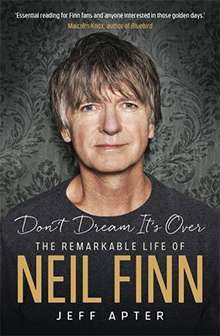 Subtitled “The Remarkable Life of Neil Finn”, Don’t Dream It’s Over carries a cover blurb that starts “Essential reading for Finn fans …“.
Subtitled “The Remarkable Life of Neil Finn”, Don’t Dream It’s Over carries a cover blurb that starts “Essential reading for Finn fans …“.
I think that’s true, but die-hard fans who adore this nice, super-talented bloke might get a bit of a surprise.
I, for one, came out of this book perhaps not liking Neil Finn quite as much as I did before.
I guess I had a vague awareness of band personnel comings and goings and a kind of a sibling rivalry with brother Tim, but I really didn’t have the background to put the man into perspective.
This is absolutely not because the author sets out to tear him down. Quite the opposite. Jeff Apter does his usual immaculate job in researching Neil Finn’s life and times, and is no way judgemental. He simply lets the facts, Finn’s own words and comments from the people around him tell their own story.
That story is of a masterful songwriter, one of the greatest of his generation, rightly compared to the best ever and adored by other writers and musicians, as well as by millions of fans of the work of Split Enz, Crowded House, the Finn Brothers, and his solo work.
It’s also the story of a family man in an uncertain business, an artist determined to stay true to his art, a New Zealander through and through, and a friend who depends deeply on his friendships.
Within that story, he makes decisions that have very negative repercussions for those very friends and colleagues he values so highly, sometimes to follow his artistic instincts, sometimes to secure his family’s future.
It is indeed a remarkable life, and he’s a remarkable man, but he makes some remarkably hurtful decisions. That the people he sacks keep coming back to him says as much about the strength of their character as it does about his willingness to admit mistakes.
To be fair, there’s no training program for becoming a master tunesmith and world famous musician, and Finn was tossed into it at a young age among older colleagues, eventually emerging as a leader and maker of decisions. If you’re the person coming up with the hit songs, you get to say how things go.
That doesn’t always mean you’re the best person to be making the decisions, though. When Neil is having trouble coming up with the songs for the third Crowded House album, he sets up a side project with brother Tim, where they’ll co-write some songs with a view to recording a Finn Brothers album.
The idea works brilliantly, and they come up with some excellent songs. Their writing and harmonies complemented each other, and so did their methods. I found this passage very insightful.
“Neil wasn’t the most organised songwriter; he relied on flashes of inspiration. Tim meanwhile, was all about structure: he’d come to each session with a pencil and a legal pad, ready to work. When Neil worked alone, he’d sometimes spend months searching through tapes for something he liked, but now, working with his more organised brother, the good stuff was much easier to access – Tim would have everything written down.”
It’s not insignificant that the best songs that came out of those sessions – “Weather With You”, “Four Seasons in One Day”, “Chocolate Cake”, “It’s Only Natural” – were pretty much immediately drafted onto the next Crowded House album. The Brothers project was shelved, and Tim was invited to join the band. The latter turned out not be such a great idea, and despite the massive success of the Woodface album, Tim left the band during a UK tour.
The revolving door of band members is astonishing, perhaps best highlighted by Neil’s 1989 sacking of Nick Seymour because the bass player was “just not pushing my creative buttons anymore”. With everyone around him telling Neil what a bad idea this was, it still took several weeks before Seymour was able to put his case, at which point Neil said, “All right, fair enough”, and Seymour was back in.
Apter conveys all this without making Neil Finn sound like a monster, he’s just a bloke following his instincts, which are impeccable when it comes to crafting beautiful songs but maybe a bit dodgy when it comes to the rest of life.
What Apter also does brilliantly is create context. Throughout the book, you get a really clear sense of timelines, what’s happening musically within the band and the rest of the world, and what’s happening inside Finn’s family. It might not be possible to get really deeply inside Finn’s mind (and maybe not all that desirable) but the book is a lovely account of, among other things, how musical product is made and delivered, and how musicians collaborate.
I love that when Finn was looking for an album producer for the debut Crowded House album, he sent a tape of “Don’t Dream It’s Over” to Mitchell Froom, who returned it with the organ solo added that now so distinguishes that song, inspired by Procul Harum’s “A Whiter Shade of Pale”. Froom got the job.
There’s lots of that kind of detail in this book, from Neil’s manic eyebrow work in the “I Got You” video to how and why he decides to join Fleetwood Mac. I laughed, I cried, I stopped to watch videos and play tracks, and I occasionally gasped. Remarkable, indeed.
Highly recommended.